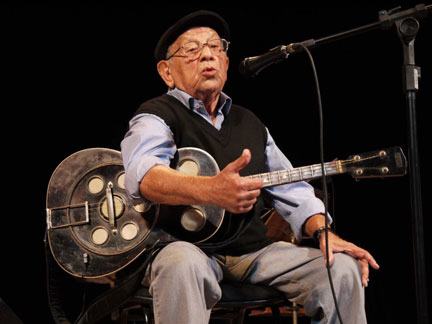The puzzling origins of “Nova Ilusão”
When two musicians team up to compose a song, who writes the lyrics?
8 September 2014
Zé MenezesWhen the virtuoso multi-instrumentalist, composer, and arranger Zé Menezes passed away on 31 July 2014, just a month shy of his 93rd birthday, almost every obituary in the Brazilian press mentioned that his first recorded song was the samba “Nova Ilusão,” co-authored with Luiz Bittencourt and recorded by Os Cariocas in 1948. It was also the vocal group’s first record (with “Adeus América” on the B side), although they had already made a name for themselves on Rádio Nacional.
“Nova Ilusão” is, perhaps, the most enduring of Menezes’ songs, and he played it repeatedly over the years, as have various other notable artists, both vocalists (Neuza Maria, Billy Eckstine, João Gilberto, Alaíde Costa, Joyce Moreno) and instrumentalists (Dick Farney, Radamés Gnattali, Luiz Eça, Arthur Moreira Lima).
Like “Carinhoso,” this samba lends itself to both vocal and instrumental interpretations. Unlike “Carinhoso,” it can be—and has been—interpreted in a wide assortment of moods, from Alaíde Costa’s lugubrious torch song to Luiz Eça’s jazz dançante and Arthur Moreria Lima’s étude-like variations, arranged by Gnattali.
The lyrics are heart-rending in a quiet, resigned, way. A fatalistic mood prevails throughout the song (“It was, perhaps, destiny”; “I don’t even know if I smiled or cried”; “I don’t know if for good or for bad”). The illusion of lasting love is not new but renewed:
I was so pleased
At feeling our love revive
That I don’t even know if I smiled or cried
I could hardly believe it
[...]
But it lasted only briefly in the end
And this new illusion ended
I don’t know if for good or for bad
You left and did not returnWho wrote these lyrics? The 33-year-old Bittencourt (born in 1915 and presumably still alive today), the 27-year-old Menezes, or both? On whose experience do they draw?
Nova Ilusão
José Menezes/Luiz BittencourtFoi o destino talvez
Causador desse sonho feliz
Ter você junto a mim outra vez
Relembrar todas juras que fiz
Tão satisfeito fiquei
Ao sentir nosso amor reviver
E nem sei se sorri se chorei
Custei até mesmo a crer
Recomeçamos assim
A nossa felicidade
Jamais alguém pensaria
Que aquela amizade
Viesse de novo a ter fim
Mas durou pouco afinal
E essa nova ilusão terminou
Eu não sei se por bem ou por mal
Você foi e não voltouThe tone is urban and sophisticated, more in keeping with Bittencourt’s Rio origins than with Menezes’ nordestino background. Of the two, Bittencourt was by far the more experienced songwriter, having been producing successful songs—some of them written alone—since 1937. Yet both authors were primarily musicians. They shared a similar trajectory in Rio’s radio stations and worked closely with the same musicians, notably Radamés Gnattali and Garoto.
Luiz Bittencourt (2) at Rádio Nacional with Almirante (1), Nuno Roland (5), and Lamartine Babo (7)None of the printed reference works I consulted discusses the origins of “Nova Ilusão.” Zé Menezes was mum about it in his various interviews, and Luiz Bittencourt has long since vanished from the public scene. The latter had such a rich involvement in Brazil’s music industry, be it in radio, records, or orchestras, yet no one has sought him out for an oral history.
Here is a disc review published in the Rio newspaper Diário da Noite upon the release of “Nova Ilusão.”
Review published in Diário da Noite, 2 July 1948Popular Discs
OS CARIOCAS — “Nova Ilusão” **** “Adeus América” **** — One of our best vocal groups, the Cariocas return auspiciously to the wax1 with these two excellent sambas.
“Nova Ilusão,” by Luiz Bittencourt and José Menezes, receives a light and smooth treatment from the group’s solosit. His voice is pleasant, his phrasing simple and calm. His whistling, too, is like singing. The reverse is an infernal samba-batucada, authored by Haroldo Barbosa, the prestigious lyricist of E-8.2 Os Cariocas show themselves perfectly at ease in it, obtaining different effects and intonations. Proving their versatility, the boys insert the little phrase Hey-ba-ba-re-bop that would be ridiculous coming from any other group.
This is really a group that makes our popular music proud. As good as the Pied Pipers or any other Yankee combo of renown. (Continental)
1. In fact, it was the group’s debut recording.
2. PRE-8 were the call letters of Rádio Nacional do Rio de Janeiro.The record was so successful that Bittencourt and Menezes came back a year later with “Mais Uma Ilusão,” recorded by Nuno Roland (the recording may be heard by doing a search in the Instituto Moreira Salles archives.
We may never get to the bottom of the question, but we can enjoy two more interpretations of this memorable samba.
Copyright © 2014 Daniella Thompson. All rights reserved.




